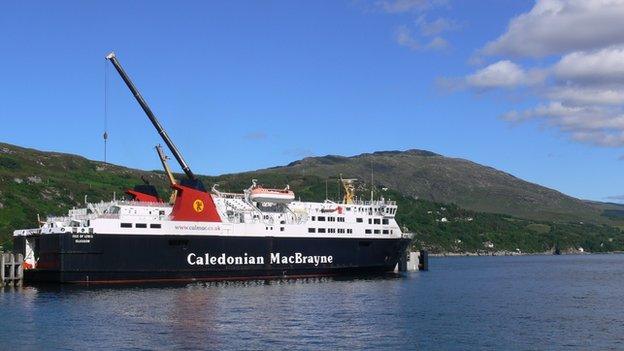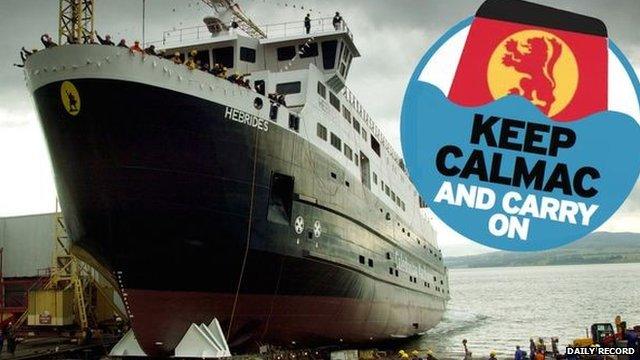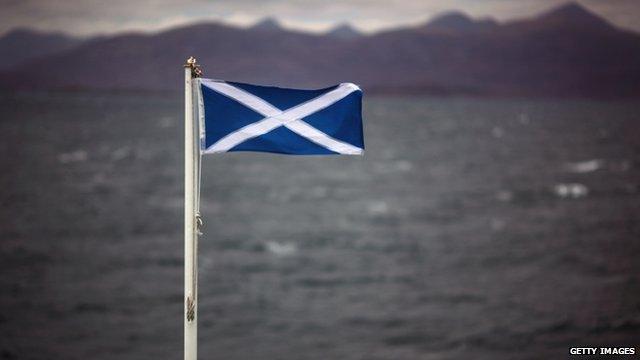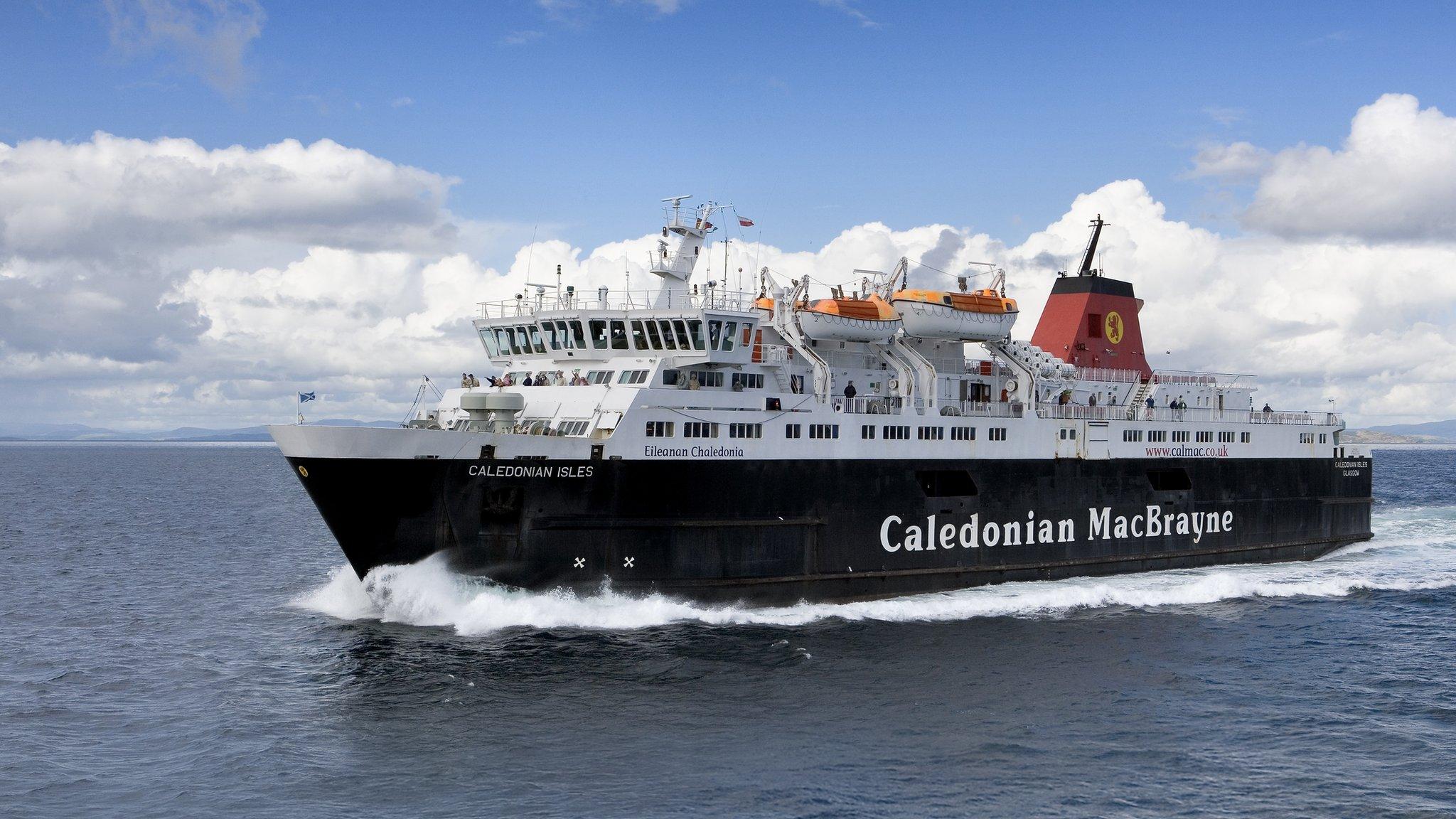What's the CalMac ferry strike all about?
- Published
Hundreds of Caledonian MacBrayne staff have begun industrial action that will cause three days of ferry disruption across the west coast. But what has led to the strike action?

How was the dispute triggered?

A new contract to run west coast and Hebrides ferries will be decided upon next year
CalMac's contract to run Clyde and Hebrides ferry services comes to an end next year.
The Scottish government has put the contract out to tender, in line with European rules.
The RMT union has concerns that, regardless of who wins, the new contract will see changes in employees' current terms and conditions.
A reduction in staff numbers and pensions are key areas of concern.
The RMT has asked that the government guarantee in the new contract that compulsory redundancies do not happen and existing terms and conditions are continued.
This is a lucrative contract with the Scottish government providing up to £1bn in funding to help the winning company improve services and to provide the road equivalent tariff discount scheme.

So, what do we know about CalMac?

In a typical year, CalMac carries nearly 4.7 million passengers on routes along Scotland's west coast
CalMac Ferries Ltd (CFL) was created in 2006 and is a wholly owned subsidiary of David MacBrayne Ltd which in turn is wholly owned by the Scottish government.
It operates 27 Clyde and Hebrides Ferry Service routes which undertakes 130,000 sailings and carries about 4.7 million passengers; 1.1 million cars and 93,000 commercial vehicles every year.
The company employs 1,342 people including 200 at its headquarters in Gourock, Inverclyde.
CalMac returns to the Scottish government any profit it achieves over the pre agreed profit level of £1.5m.

Will CalMac win the new contract?

Serco is a service provider that has many transport contracts, including taking prisoners from jail to court
Not necessarily. Serco, an international service provider and private company, is competing against Cal Mac for the new deal. It says its customers are national and local governments as well as "leading companies".
It operates not only in the UK, but throughout Europe and in Asia and North America.
Serco's website boasts, external: "Our frontline delivery involves us in vital areas of public life, including providing safe transport, finding sustainable jobs for the long-term unemployed, helping patients recover more quickly, improving the local environment, rehabilitating offenders, protecting borders and supporting the armed forces.
"In a nutshell, we don't believe that the private sector is automatically better than the state sector at delivering services, but we do believe that competition helps out the most innovative approaches."
Serco isn't new to ferry operating as it already runs Northlink ferries to Orkney and Shetland.

So, is this about public versus private?

The Daily Record newspaper launched a campaign to keep CalMac as the ferry contractor
The Scottish government's Transport Minister Derek Mackay believes the new tender process does not amount to privatisation.
However, others are taking a different view, including the Daily Record newspaper.
In an editorial earlier this month, external, the paper said: "What the Scottish islands cannot do without are proper ferry links to the mainland which bring not only the essentials of life, but the essentials of a working commerce and tourist economy.
"The privatisation of the state-owned CalMac is not just another public sector sell-off.
"The tender process, the plumping up of the ferries and ports and the fabricated pensions dispute with CalMac crews all point in one direction.
"Favoured status is being given to the one bidder, Serco."

When will a decision on the contract be made?

The west coast of Scotland ferries are seen as an important lifeline for rural communities
The two companies vying for the contract will submit their final tenders in December this year.
The winning bidder will find out in May next year and will begin operating the ferries from 1 October 2016 for about eight years.

How could strike action affect my travel plans?

CalMac has not yet detailed which ferry service will be hit by the strike on Friday
CalMac has already altered its timetable in light of the "work to rule" by staff which began on Wednesday. On Friday, a full day of strike action is planned which CalMac has said will cause "severe" disruption.
Its current statement says, external: "At this stage we are not in a position to say what services will be disrupted. We will be keeping customers up to date as soon as we have relevant information."
CalMac has advised passengers to think about whether they need to travel during the "work to rule" and strike days.
The company adds that those who have already bought a ticket and have decided not to travel will get a full refund or they can book an alternative sailing.

Where do I find out more information about how the dispute will affect travel?

CalMac says it will keep passengers up to date with the likely disruption
The CalMac website, external is the best place to get information. You can also follow updates on its own twitter feed @CalMac_Updates, external. Alternatively, there is a hotline number 0800 066 5000.
Also, keep tuned to BBC Radio Scotland travel updates, and the travel team's social media updates at @BBCTravelScot, external.
- Published22 June 2015
